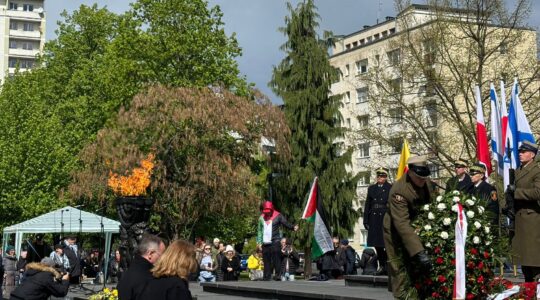WASHINGTON (JTA) — Venezuela is an extraordinarily wealthy country. It has the most important oil reserves in the world and it stands out globally for its rich biodiversity. But Venezuela’s greatest wealth is its people, a remarkable combination of indigenous peoples, Afro-Venezuelan communities, and families of European, Asian and Middle Eastern descent.
Venezuela’s Jewish community is an integral and essential part of our country’s singularly diverse society. It has had and continues to have a powerful impact on Venezuelan history and culture.
Centuries ago, a Jewish community took root in the important colonial port town of Coro and made key contributions to the rich literary and artistic traditions that thrived there. In the early 19th century, Venezuelan Jews were among the first to embrace the progressive ideals of Simon Bolivar and some, like Samuel Henriquez, were at his side fighting the Spanish army. Today, Venezuelan Jews continue to play a key role in the arts, academia and the sciences, among other fields.
President Hugo Chavez has taken the lead in celebrating Venezuela’s rich diversity, often pointing out his own mixed African, indigenous and European heritage. He has sought to fight the legacy of racism and discrimination that has lingered since the colonial era.
So it has been especially painful for the government of Venezuela to hear itself accused of prejudice toward Venezuelan Jews.
It is worth noting that these accusations very often come from organizations and media based outside of Venezuela. One of the first accusations of anti-Semitism was made by an Argentinean organization in December 2004 based on a de-contextualized statement that did not mention Jews.
A Venezuelan Jewish organization issued a strong rebuke against these claims and expressed its dismay at not having been consulted before they were published.
To clearly underscore his opposition to anti-Semitism, President Chavez met with the president of the World Jewish Congress last August and expressed his unequivocal opposition to all forms of anti-Semitism. In December he signed a joint declaration with the presidents of Argentina and Brazil in which Chavez committed to supporting efforts to fight anti-Semitism and all other forms of discrimination and racism throughout Latin America.
Nevertheless, the anti-Semitism accusation reappeared with renewed vigor in February after the Tiferet Israel synagogue in Caracas was vandalized. Some U.S. media outlets immediately attributed the attack to an alleged “climate of anti-Semitism” in Venezuela.
Within days, however, a thorough criminal investigation revealed that the primary motive for the break-in was theft. Among those apprehended was an ex-security guard for the synagogue who assisted his accomplices in getting past the security barriers leading to the area containing a safe with cash.
Sadly, most of those who directed these new accusations at the Venezuelan government never reported the conclusions of the investigation. [Editor’s note: Some members of Venezuela’s Jewish community have disputed the investigation’s finding that the Tiferet Israel synagogue attack was a break-in.]
One positive side of this lamentable incident is that it led to the deepening of relations between the Venezuelan government and the Venezuelan Jewish community. In the hours following the attack, high-level Venezuelan officials contacted the community and, in the days that followed, a number of meetings took place between Cabinet officials and Venezuelan Jewish community leaders, as well as with representatives of the Latin American Jewish Congress and the World Jewish Congress.
Though the representatives of some of these organizations have expressed disagreement with the Venezuelan government’s condemnation of the Israeli government’s military action in Gaza, President Chavez and his ministers have emphasized that these differences should not be seen as an obstacle to relations with the Venezuelan Jewish community.
As President Chavez recently said to a leader of the Venezuelan Jewish community, “This country is as much yours as it is mine.” We Venezuelans are one family. And we cannot and will not allow wedges to be driven between the diverse communities of culture and faith that make up our country’s extraordinary wealth.
(Angelo Rivero Santos is the charge d’affaires at the Washington embassy of the Bolivarian Republic of Venezuela.)





